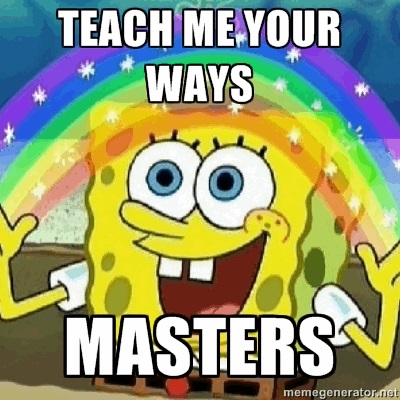
Oklahoma is rewriting standards for the 143rd time in the past decade – each time ‘raising the bar’ even higher than the time before, we are assured. National struggles continue over Common Core in all its manifestations and retitled remnants. Should we move to the ACT to save money? Is it better to grade writing exams with crappy software or crappy temps rounded up on Craigslist? Should we punish 3rd graders for not developing at a pace of our liking? Stop high schoolers from graduating for their test scores? Devalue teachers who take on tough classes and work in the most challenging districts? The rhetoric alone gives me a headache.
We’re can’t even agree on WHAT we should be measuring – which subjects, which skills, and at what level. Should we one day solve that (we won’t), we’ll still have to reach some sort of consensus HOW we can evaluate whatever it is with any sort of accuracy or consistency (we can’t) – and all at lowest-bidder prices.
Fear not, my Eleven Faithful Followers – for I am about to reveal to you the final truth regarding this matter. I am confident my solution is both eloquent and attainable, for that is how I roll. You might want to sit down for this.
To hell with the tests.

Seriously, $&%# ‘em. I refuse to care about them one way or the other anymore. I’m tired of watching good teachers with missionary zeal end up stressed out and derailed due to the pressure of some stupid state test and its randomly shuffled cut scores. I hereby revolt against the entire process.
Parents are already opting out in some places, and a few brave teachers in Tulsa Public have refused to administer anything they believe is bad for their kids. I applaud each and every one of them.
But what I’m instituting is more basic. Starting today, we universally refuse to worry about tests or testing. When they happen, they happen. Our kids will do well, or they won’t. Our schools will shine, or they won’t.
We must no longer give even tiny little damns.
You didn’t go to teacher school to improve test scores – none of us did. You, like the vast majority of your peers, signed up to save the world – or part of it, anyway. You became a teacher because you love kids, and history, or music, or art, or math, or literature, or some other life-altering something. You signed up because you care.
Silly idealist.
You may teach a high stakes, heavily tested subject, or something marginalized as ‘extra-curricular’. Maybe you coach, or sponsor, or organize, or publish. Maybe you don’t. Maybe you just show up and teach your tired old butt off every day and that will just have to be enough.
But you signed up to make a difference. You signed up to teach kids.
So let’s teach. Let’s love our kids where they are and who they are, without concern for where they stand in relation to someone else’s legislative pablum. We’ll challenge them, and push them, and demand great things of them no matter WHAT their circumstances or gifts – but I’m no longer willing to frame anything important in terms of state standards or national goals. I’ll work for my clueless lil’ darlings, and I’ll do it because I like it. I don’t care about the rest.
So to hell with the tests.

Most of the time, if we just teach the way we know we should, the kids will do fine on the tests anyway. But even if they won’t, as soon as we begin to focus on things BECAUSE they’ll be on the test, or rush through content BECAUSE the test is coming, our priorities drift away from our calling. Testing puts us in an adversarial role towards our weaker students, and rewards ZIP codes over zeal.
Testing is anti-learning, and anti-education. It doesn’t even $#%&ing work the way they keep pretending it does.
I can’t prevent lawmakers from labeling my kids as losers, or failures, or stupid, but I don’t have to be the instrument of such blasphemy. Bill Gates may excoriate my darlings for their lack of college and career readiness while Sir Michael Barber shakes his mass-mandated little fingers at them for their reading scores or their lack of interest in Algebra II – but I don’t have to help.
I don’t have to abuse my kids to please lawmakers or publishing companies. I refuse.
My students are awesome. Some of them are lazy, but that’s fixable. Others lack certain skills or critical content knowledge, but I’ll ride their behinds until they progress. They’re amazing, even while they make me crazy. They’re perfect, even when I have to kill them dead in front of God and everyone in order to get their attention. Give me those tired, poor, muddled classes, yearning for a ‘B’.
I love them.
What will happen to my kids if they don’t pass their state tests? They might have to take them again, which kinda sucks. If not, there are a dozen alternate ways to graduate. Generally, as long as the children are suffering, hate anything involving learning or school, and replace natural belief in their own possibilities with a deep loathing towards their truest selves, the state is satisfied.
I don’t want students to go out of their way to fail the damn things, but neither will we divert meaningful time or energy into passing them – the trade-off is simply too great.

If this is a calling, then let’s do it as a calling. That’s why we put up with the crappy conditions in some places and the degrading pay in most. It’s why we’re so tired, and why it’s sometimes hard not to become jaded, or bitter, or simply give up and go through the motions.
If this is a calling, then let’s do it as a calling. Make a difference, help kids, pour yourself out in a desperate effort to light a few more fires. Look your broken ones in the eyes and tell them that the world is a liar, and that they’re amazing, and beautiful, and powerful, and smart. If you can’t – if you’re afraid because someone’s pressuring you over test scores, and that’s the priority – then why are you even here?
Seriously – go get a real job. There are better gigs. Some even pay.
Let them fire you. Fire ALL of us. Well, the good ones, at least – the ones unwilling to play that game, even a little. The ones who’ve decided to follow their calling until they’re shown the door.
Let those principals and superintendents reach out to that long line of people desperate to teach public school in Oklahoma, or Texas, or wherever you are. Around here, that line consists of something like… zero people.
OK, that’s not entirely true – there’s that pompous unshaven guy with all the degrees who spills his coffee everywhere, and that weird chick with no concept of personal space or social cues. I guess they could hire both of them. But after that, their options are pretty much exhausted.
The rest of us aren’t going to worry about the tests, no matter how many times they’re revised or how high a ‘bar’ some legislator thinks they’ve set. Our bar is higher anyway – and so much better.
If they don’t like what we’re doing, they can find someone who will cooperate. We’ll sell shoes or fix computers or work in our brother-in-law’s insurance office. More money, less stress.
To hell with your tests. I don’t care about them, and I won’t play along any more. I’ll no longer compromise my calling or my kids to cater to the rhetoric of liars and fools.
And neither should you.

RELATED POST: He Tests… He Scores!
RELATED POST: Assessments & Grades – Why?
RELATED POST: Ms. Bullen’s Data-Rich Year
RELATED POST: Roster Villification

 #OklaEd blogger extraordinaire Mindy Dennison recently
#OklaEd blogger extraordinaire Mindy Dennison recently  So, as I’ve been locked in eternal (well, two days) combat with the unacceptable word count of my most recent elucidation of favorite Civil War shenanigans, I thought it would be diverting as a group to share similar loves from our classrooms, our book research, or whatever. It would certainly entertain ME to hear from YOU, and it might even promote bonding and academic conversation and maybe even stir up things about this gig that DON’T make us want to take up cordless bungee-jumping.
So, as I’ve been locked in eternal (well, two days) combat with the unacceptable word count of my most recent elucidation of favorite Civil War shenanigans, I thought it would be diverting as a group to share similar loves from our classrooms, our book research, or whatever. It would certainly entertain ME to hear from YOU, and it might even promote bonding and academic conversation and maybe even stir up things about this gig that DON’T make us want to take up cordless bungee-jumping.
 It’s so teacher of us – a variety of challenges complete with topics and word limits have been issued to various #oklaed bloggers lately, some with DUE DATES! In other words, we’re giving each other actual assignments.
It’s so teacher of us – a variety of challenges complete with topics and word limits have been issued to various #oklaed bloggers lately, some with DUE DATES! In other words, we’re giving each other actual assignments.



 “They are, indeed,” said the Scarecrow, “and I am thankful I am made of straw and cannot be easily damaged. There are worse things in the world than being a Scarecrow.”
“They are, indeed,” said the Scarecrow, “and I am thankful I am made of straw and cannot be easily damaged. There are worse things in the world than being a Scarecrow.” I think the hardest thing about teaching, about marriage, about parenting, about citizenship, about socializing, cooking, fixing, feeling, running, thinking, being – is paying attention.
I think the hardest thing about teaching, about marriage, about parenting, about citizenship, about socializing, cooking, fixing, feeling, running, thinking, being – is paying attention. I’ve taught some great lessons in my time, and watched some young people have some pretty impressive lightbulb moments. Not every day, though – not most days, or most kids, or most lessons. Sometimes I really step in it, saying or doing something reckless and unnecessary – which, I mean, is the same reason the good stuff works. But sometimes it doesn’t, and I hurt someone, one of my kids, or peers, or worse – I alienate them. Lose them for the light.
I’ve taught some great lessons in my time, and watched some young people have some pretty impressive lightbulb moments. Not every day, though – not most days, or most kids, or most lessons. Sometimes I really step in it, saying or doing something reckless and unnecessary – which, I mean, is the same reason the good stuff works. But sometimes it doesn’t, and I hurt someone, one of my kids, or peers, or worse – I alienate them. Lose them for the light.
